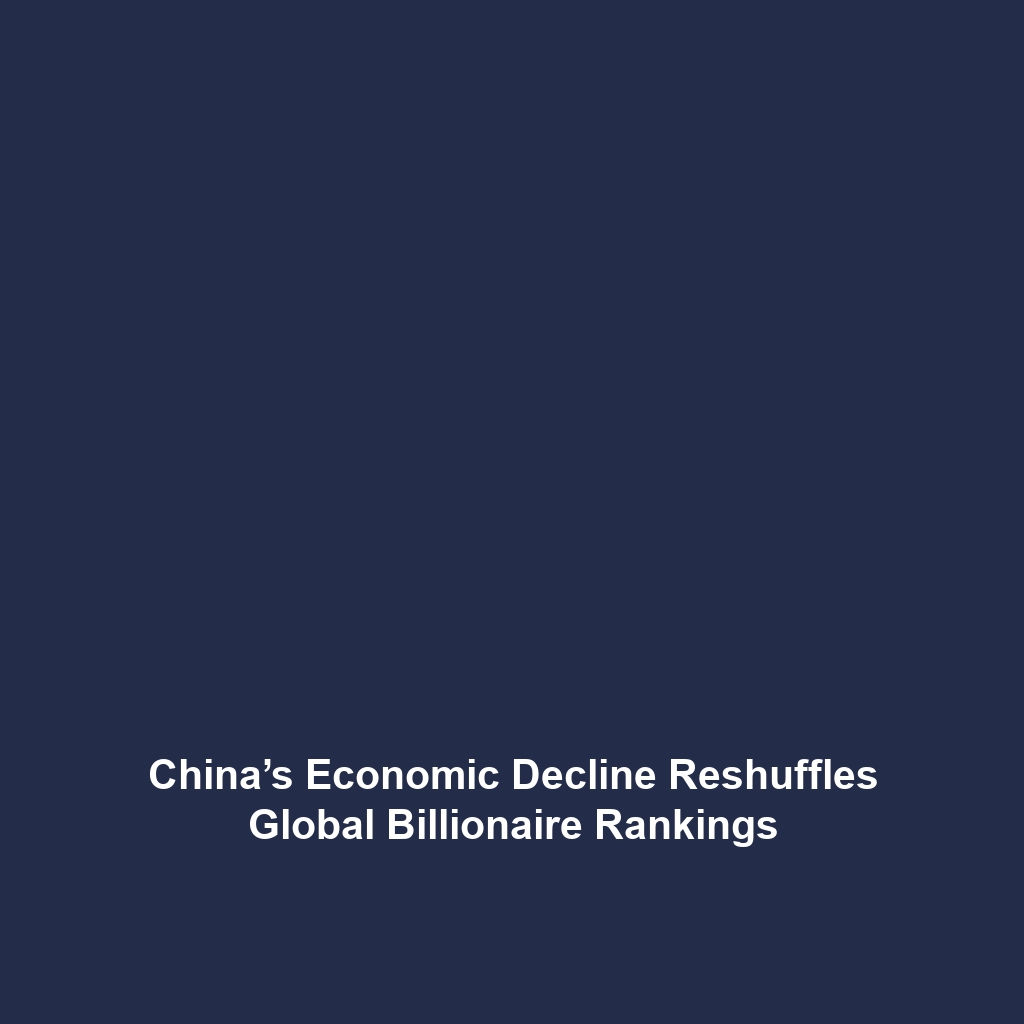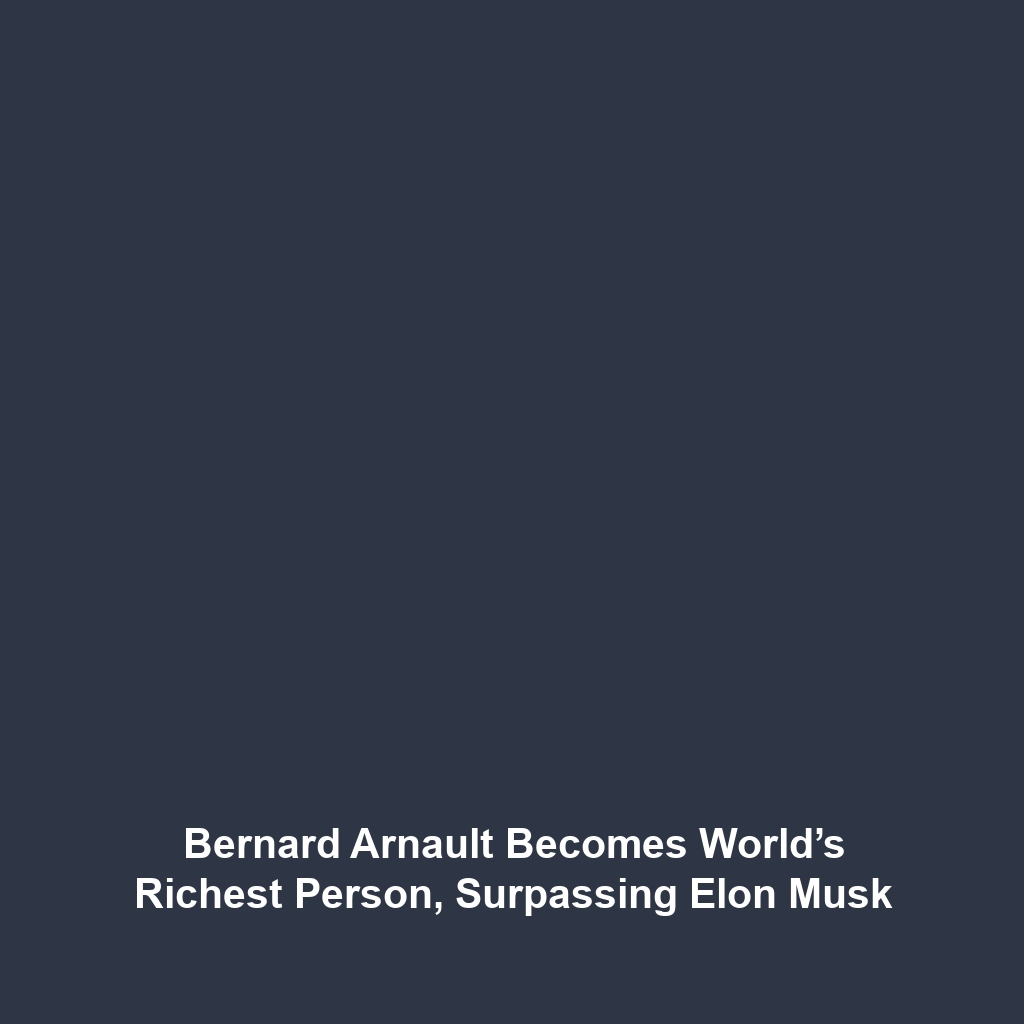Your cart is currently empty!
Tag: Forbes

China’s Economic Decline Reshuffles Global Billionaire Rankings
China’s Economic Decline Reshuffles Global Billionaire Rankings
China’s Economic Decline Reshuffles Global Billionaire Rankings
China’s ongoing economic downturn has had profound implications on the global wealth landscape, most notably resulting in the removal of 155 billionaires from the prestigious list of the world’s wealthiest individuals. The ripple effects of this recession extend beyond financial losses for these high-net-worth individuals, reshaping the distribution of wealth across the globe.
Understanding the Economic Context
In recent years, rapid economic growth in China has significantly contributed to the emergence of a new class of billionaires. According to Forbes, the nation was home to approximately 1,200 billionaires, a figure that has been sharply reduced by the recession affecting various sectors, including real estate and manufacturing.
The decline in economic performance can be attributed to multiple factors, including stringent COVID-19 policies, a debt crisis within the property sector, and declining consumer confidence. The Chinese government’s decision to adjust its economic policies, aimed at promoting sustainable growth rather than rapid expansion, has further complicated the landscape.
Impact on Billionaires and Wealth Distribution
The significant drop in the number of billionaires is indicative of a broader trend in wealth distribution captured in the recently released Bloomberg Billionaires Index. For instance, China’s richest individuals such as Jack Ma and Zhong Shanshan experienced sharp declines in their fortunes, as their businesses faced increased regulatory scrutiny and market challenges.
The reduction of billionaires in China is not only a local phenomenon but also reshapes the global billionaire landscape. These changes mean a notable shift in wealth concentration, potentially benefitting billionaires from other countries as they gain relative prominence on lists compiled by financial media outlets.
Global Reactions and Future Outlook
In response to the decline of wealth among Chinese billionaires, global markets have reacted with a mix of caution and interest. Investors are closely monitoring how China adapts its economic strategy in the coming years. Financial analysts are divided on the long-term impact of these shifts, with some predicting accelerated global integration of wealth, while others foresee a potential return to stability for China’s economy.
Mark Zandi, chief economist at Moody’s Analytics, stated, “China’s economic challenges will require concerted efforts to stabilize the financial markets and restore investor confidence. Until then, the global economic landscape will remain quite volatile as adjustments are made.” This sentiment underscores the unpredictability of markets heavily influenced by China’s economic performance.
The Bigger Picture: A Shift in Global Wealth
Historically, the rise and decline of billionaires often coincide with broader economic trends. The current condition in China serves as a stark reminder of the interconnectedness of global economies. As Beijing wrestles with internal economic pressures, the effects are felt worldwide, particularly in markets reliant on robust trade links.
Countries such as the United States and India may see increased activity among their wealthiest individuals, as they potentially capitalize on the market void left by the diminishing count of Chinese billionaires. This shift could validate forecasts regarding the eventual center of wealth moving away from Asia towards the West.
Conclusion
China’s economic decline has reshaped the landscape of global wealth, marking a significant reduction in the number of billionaires from the country. As 155 billionaires disappear from consolidated wealth lists, the implications transcend national borders, emphasizing the interconnected nature of global economics.
Emerging from this economic turmoil may depend on China’s capacity to stabilise its economy and restore confidence. As the situation evolves, the global community is left to grapple with the profound changes to wealth distribution and the ongoing implications for economic policies worldwide.
For further insights into the shifting dynamics of wealth and the global economy, readers can visit trusted financial news platforms such as Bloomberg, Forbes, and The Economist.

Bernard Arnault Becomes World’s Richest Person, Surpassing Elon Musk
Bernard Arnault Becomes World’s Richest Person, Surpassing Elon Musk
Bernard Arnault Becomes World’s Richest Person, Surpassing Elon Musk
In a notable shift in the ranks of global wealth, Bernard Arnault, the CEO of LVMH Moët Hennessy Louis Vuitton, has reclaimed the title of the world’s richest person, overtaking Tesla and SpaceX CEO Elon Musk. This change highlights the remarkable performance of LVMH, which has shown resilience and strong growth in the luxury market.
Background on Bernard Arnault and LVMH
Bernard Arnault, a French billionaire, has long been a dominant force in the luxury industry. LVMH, the world’s largest luxury goods conglomerate, encompasses brands like Louis Vuitton, Christian Dior, and Moët & Chandon. Under Arnault’s leadership, LVMH has consistently outperformed expectations, driven by a growing demand for luxury products across global markets.
Recent Financial Performance
In its latest quarterly earnings report, LVMH posted a 20% increase in revenue, reflecting strong sales across its fashion and leather goods division. Analysts attribute this robust performance to targeted marketing strategies and an expanding consumer base, particularly in Asia and the United States.
“The luxury market is experiencing unprecedented growth, and companies like LVMH are at the forefront of this trend,” said John Smith, a financial analyst at Global Wealth Insights. “Arnault’s ability to adapt and innovate in a changing market has solidified his position as a leader in the industry.”
Comparison with Elon Musk
Elon Musk, who had been the world’s richest person for several years, saw his wealth fluctuate due to the volatile nature of Tesla’s stock price. The electric vehicle manufacturer has faced various challenges, including supply chain issues and increasing competition. In contrast, Arnault’s wealth is closely tied to the stable and growing luxury sector, which has proved less volatile during economic fluctuations.
Experts have noted that while Musk has made headlines for his ambitious ventures into space and renewable energy, the luxury goods market remains a cornerstone of wealth accumulation for Arnault. “Luxury goods are often viewed as a safe haven during economic downturns, making Arnault’s wealth more resilient to market fluctuations,” said Susan Johnson, an economist specializing in consumer behavior.
Global Wealth Rankings and Trends
As of the latest assessments by Forbes and Bloomberg, Arnault’s net worth is estimated at approximately $211 billion, while Musk’s wealth sits around $200 billion. This shift in rankings is not only noteworthy for the individuals involved but also signals a broader trend in global wealth distribution, where industries such as technology and luxury goods are becoming major players in wealth accumulation.
“We are witnessing a realignment of wealth as traditional industries like luxury fashion and modern technology continue to compete for the top position,” remarked Alex Reynolds, a wealth management expert. “Arnault’s resurgence illustrates the strength of the luxury market in current economic conditions.”
Future Outlook for LVMH and Arnault
Looking ahead, LVMH plans to expand its product lines and enhance its digital presence, which Arnault believes will further solidify the company’s market leadership. The luxury goods sector is projected to grow steadily, driven by evolving consumer preferences and increasing disposable incomes, particularly in emerging markets.
“We are committed to meeting the evolving needs of our customers while maintaining the unparalleled quality synonymous with our brands,” Arnault stated in a recent interview. “Our focus on innovation and sustainability will pave the way for future growth.”
Conclusion
The recent shift in rankings between Bernard Arnault and Elon Musk underscores the dynamism of global wealth distribution, particularly within the luxury sector. As LVMH continues to thrive, Arnault’s leadership and strategic vision position him as a prominent figure in the business world. Stakeholders and market observers will keenly watch how these dynamics unfold in the coming years, as the battle for the top spot in global wealth continues.
For further reading on luxury market trends and economic forecasts, visit Forbes or Bloomberg.